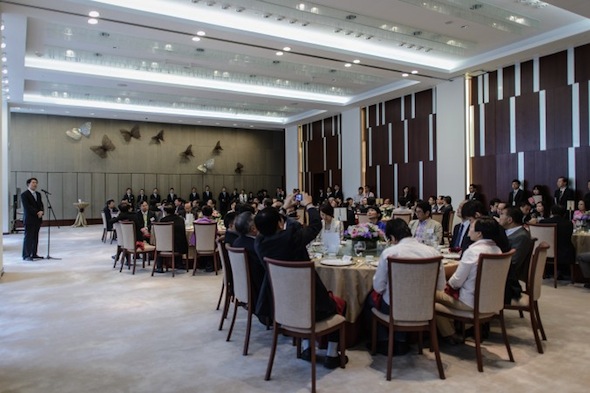Hong Kong Becoming Stage for Communist Infighting, Says China Analyst
Epoch Times
By Li Zhen, Epoch Times

HONG KONG—An accusation of graft against a high-ranking Chinese Communist Party official, an invitation to lunch from the Hong Kong Council President, and the failure of the Hong Kong police to protect the freedoms of speech and assembly—these disparate events in mid-July are seen by a China analyst as evidence of Hong Kong having become the stage for factional infighting in the CCP.
Wang Wenzhi, a principal reporter with the Xinhua News Agency-owned Economic Information Daily posted a letter on Weibo—the popular Twitter-like platform in China—on July 17 accusing Song Lin, the chairman of China Resources Co. Ltd., of deliberately purchasing “poor-quality coal assets” in Shanxi Province at an “incredibly” high price causing the company to suffer billions of yuan in losses. Wang claims to have more evidence to back up his accusation.
China Resources Co. Ltd., one of four major state-owned enterprises in Hong Kong, owns 10 listed companies and directly reports to the People’s Republic of China State Council. Song is believed to hold deputy minister ranking and is included in the central regime’s policymaking process for Hong Kong issues.
Just one day after the microblog letter allegation, on July 18, the Chinese Communist Party’s (CCP’s) Central Discipline Committee confirmed through state-run media that it had already received the report about Song and would handle the case according to the proper procedure.
The weibo letter was posted at 1:30 a.m. but was taken down about 15 hours later; the reports on the letter were also taken down, including those of state-run mouthpiece papers. Major Hong Kong media outlets such as Apple Daily, Mingpao, and Oriental Daily all had extensive reports about the accusation on July 18.
The unusually swift response from the Chinese regime, the identity of the whistle-blower, and the sudden censorship on the topic all drew speculation that the letter represents more high-level infighting among Chinese officials that has been staged in Hong Kong.
One Hong Kong-based state-owned enterprise officer anonymously told the Epoch Times that Song has close ties with senior party member Zeng Qinghong and is a loyal supporter of Hong Kong Chief Executive Leung Chun-ying.
Zeng Qinghong, a former member of the Politburo Standing Committee, long held the CCP’s portfolio for Hong Kong and Macau. He is closely identified with the faction of Jiang Zemin, and Leung Chun-ying is known to be Zeng’s protégé.
Song is the second deputy minister who has been accused by a Chinese journalist on microblog this year. On January 30, Luo Changping, deputy editor-in-chief of Caijing Magazine, wrote that Liu Tienan, director of the National Energy Administration, had fraudulently obtained loans from Chinese banks for overseas acquisitions and received bribes through his wife and son.
Liu also belongs to the Jiang Zemin faction and is currently under investigation by the CCP Central Discipline Committee.
Leung not Invited
On July 16, the pro-CCP president of the Legislative Council of Hong Kong, Jasper Tsang Yok-sing invited the director of the Liaison Office, Zhang Xiaoming, for lunch at the Legislative Council without notifying Chief Executive Leung Chun-ying.
In the 16 years since Hong Kong’s sovereignty transferred to Beijing , this is the first time the director of the Liaison Office in Hong Kong has been invited for lunch with members of the Legislative Council, without including the chief executive. Zhang stated that he attended the lunch because he wanted to listen directly to various opinions.
This high profile meeting between Zhang Xiaoming, who belongs to the Xi faction, and the Legislative Council has inspired speculation that Xi Jinping intends to reduce Leung to a mere figurehead.
Police Support Front Group
Since June 2012, the Hong Kong Youth Care Association (HKYCA) has been harassing Falun Gong practitioners, a spiritual discipline persecuted in China since 1999, by continuously disrupting their information sites, which display posters and banners about the ongoing suppression of Falun Gong.
In the latest altercation on July 14, local residents confronted the police, who refused to assist the practitioners. A Hong Kong magazine reported in August 2012 that the HKYCA shares the same office and staff as a local 610 office—an extralegal Party agency established to carry out the persecution of Falun Gong—in Shenzhen, a city located just across the border in mainland China.
Residents shouted their support for the Falun Gong practitioners, who have set up the contested information site in the Mong Kok district for years, and blamed Leung Chun-ying for carrying out the CCP’s suppression policy in Hong Kong.
One bystander told the Epoch Times that the CCP was behind the HKYCA and the police’s failure to act, while another indicated his agreement.
“The CCP must’ve told Leung Chun-ying to do this [have the police blockade the site],” the bystander said. “Then, Leung told the Department of Justice, and then the Department of Justice instructed the police. Otherwise, the HKYCA would have been dispersed long ago.”
Shi Zangshan, a U.S.-based China expert, believes that Leung has allowed the HKYCA to interfere with Falun Gong practitioners as an aid to the Jiang Zemin faction. Shi said Leung wants to mislead the international community into believing that CCP leader Xi Jinping favors continuing Jiang Zemin’s policy of persecuting Falun Gong.
These and other actions by Leung in service of the Jiang faction are known to have antagonized Xi Jinping.
The unprecedented exclusion of Leung from lunch with the head of Liaison Office suggests a signal has been sent to Hong Kong that Leung has lost favor in Beijing.
The accusation against Song Lin of China Resources, Shi believes, is a sign that Xi Jinping intends to remove Leung from office.
Translated by Tan Hohua. Written in English by Arleen Richards.
